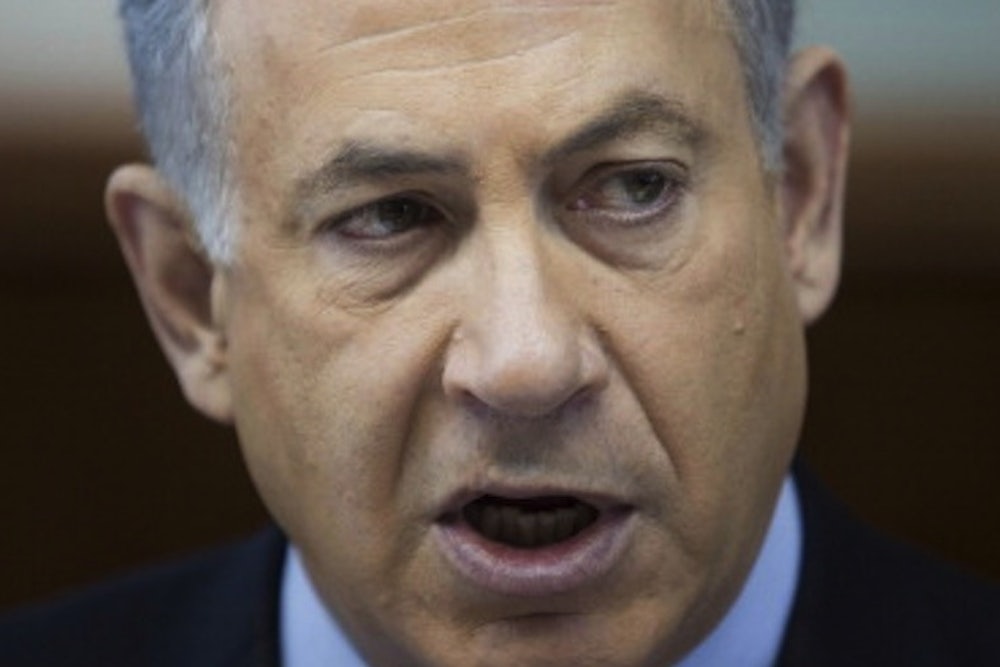There are only two credible obstacles to an Iranian bomb: economic sanctions and the possibility of an Israeli military strike. The deal signed with the Iranian regime threatens both.
In recent weeks, as a deal over Iran’s nuclear program became increasingly likely, Israeli leaders publicly warned that offering economic relief to the Tehran regime will unravel international sanctions that took years to put into place. Once relief is offered, the Israelis have argued, foreign companies and countries like Russia and China and India, always reluctant to join the sanctions effort, may well resist efforts to reinstate them.
But there is another, less publicly spoken fear in Jerusalem, and that is that the six-month freeze will actually hamper Israel’s ability to effectively launch a military strike.
Israel’s window of opportunity to launch an effective strike is closing. It is now measured in months, not years. The deal, worry Israelis, could further narrow that window.
Israelis note that the deal doesn’t cover inspections of Iran’s nuclear weaponization program, including fuses, timers and metallurgy, which will no doubt continue apace. And Israel takes for granted that the Iranians will persist in doing what they’ve done all along: lie and cheat, but this time under the cover of a deal. In every previous rounds of negotiations, after all, the Iranians continued building secret facilities. All of which could mean further reducing Israel’s timetable for a strike.
If Israel concludes that its window is closing and does decide to strike, even while the deal remains in effect, it risks becoming an international pariah—in effect exchanging roles with Iran. On the morning after an Israeli strike, Israel could find itself alone, facing tens of thousands of missiles from Hezbollah and Iran launched against its home front.
The Obama administration argues that it has not only frozen the process for six months but set back the ticking clock by ensuring that Iran’s stockpile of 20 percent enriched uranium will be dismantled. The Israelis dismiss that concession as largely irrelevant. Iran now has the capability of quickly turning its far larger stock of lower grade enriched uranium into weapons grade. The result of the deal, Israelis argue, is that the administration has set back Tehran’s nuclear program by at most one or two months, but at an enormous gain for Iran. At the end of the six-month freeze, Iran will retain its 10,000 centerfuges that are already spinning and 9,000 more that haven’t yet gone on line, as well as over 7,000 kilograms of enriched uranium, enough to make between six to eight bombs—while the international community would bicker over the extent of renewed sanctions.
The deal confirms what Israeli leaders and much of the Israeli public have come to believe about Barack Obama: that he never intended to use military force against Iran, even as a last resort, and that this president will ensure that, sooner or later, Iran becomes the next North Korea.
During the first Obama administration, the urgent Israeli question was: Is he is a friend of the Jewish state? That question was largely resolved for many Israelis during the President’s visit to Israel last March, when he won over much of the public by affirming the Jewish roots in the land of Israel and the indigenousness of Israel in the Middle East, as well as Israel’s past efforts to make peace.
Now, though, Israelis are asking this: After eight years of President Obama, will the Middle East be a safer or more dangerous region for Israel?
For most Israelis the answer is self-evident. The turning point came this summer, when Obama hesitated to enforce his own red line over Syria. That was the moment that he lost the trust of the Israeli public on Iran.
Much of the international community assumes that Prime Minister Benjamin Netanyahu is bluffing when he insists that Israel is prepared to confront Iran alone if necessary. Israel, skeptics contend, cannot risk international isolation and a rupture with the American administration.
But the determination of this Israeli government shouldn’t be underestimated. A nuclear bomb in the hands of a regime that routinely dehumanizes Israel and threatens it with destruction—just last week, Iran’s Supreme Leader Ali Khameini called Israel a “rabid dog”—would end Zionism’s promise to create a safe refuge for the Jewish people. And failure to implement Israel’s repeated threats to stop an Iranian bomb would fatally undermine Israeli credibility and deterrence in the region.
Israel’s critics often speak of the need to apply pressure against it, to “save it from itself.” This time, it may well be up to Israel to save the world from itself.
Yossi Klein Halevi is a senior fellow of the Shalom Hartman Institute in Jerusalem. He is author of the recently published Like Dreamers: The Story of the Israeli Paratroopers Who Reunited Jerusalem and Divided a Nation.
